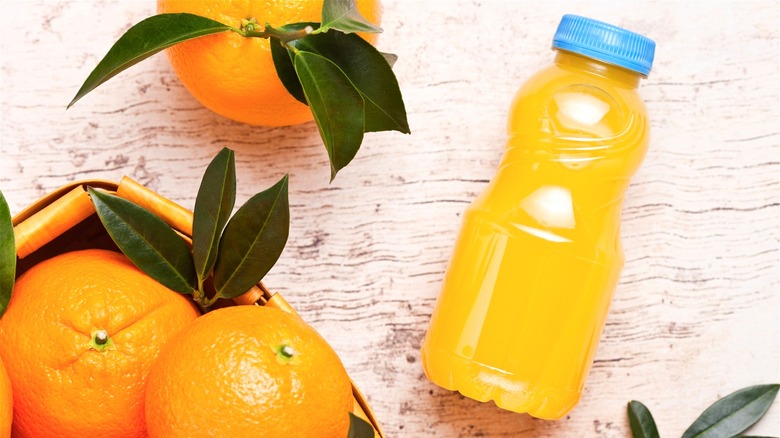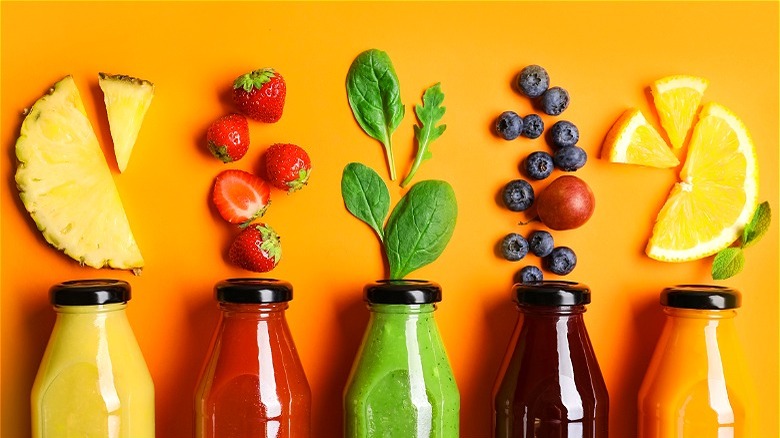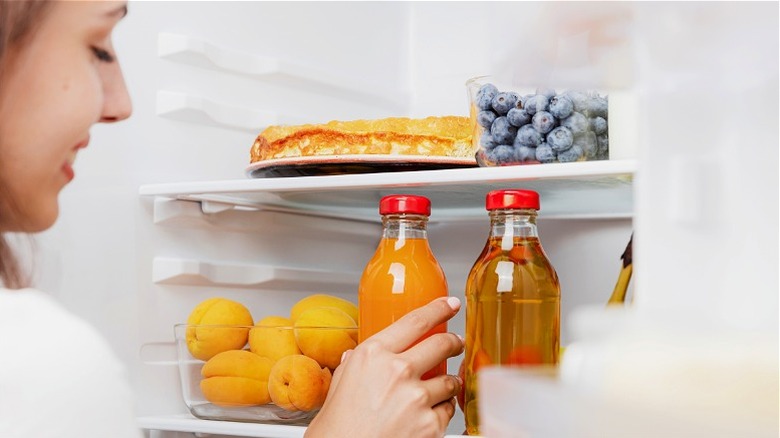Can You Drink Juice That Sat Out Overnight?
Juice is an excellent drink when you're running late and need a quick refreshing shot or two of something nutritious but also thirst-quenching — especially when it comes to the inevitable workweek rush. According to FONA, orange and apple are the most popular juice varieties in America. While most juice drinkers view this nutritious beverage as a breakfast-only drink, Florida Orange Juice claims freshly made orange juice is a great option to have around at various times throughout the day for its multitude of health benefits.
Healthline describes some of the healthiest juice varieties available: Cranberry juice has been found to fight against urinary tract infections, apple juice has naturally occurring electrolytes thanks to potassium, and vegetable juices like tomato and beet provide significant amounts of folate and antioxidants. Statista claims that in 2021, 1,367.5 million 192-ounce cases of juice were sold in the United States. With that much juice going in and out of refrigerators across the nation, people may accidentally leave refrigerated juices on the counter occasionally and assume they're safe to drink. But are there any risks to drinking juice that has sat out overnight? Before getting into why or why not, let's delve into the different types of juice available and what kind is the safest to consume.
Pasteurized versus unpasteurized juice
You probably aren't aware of the different safety-related variables to consider when choosing juice from the supermarket or your local juice bar. Firstly, if you're attempting homemade green juice, the FDA recommends certain safety guidelines to follow such as washing your hands before handling produce and making sure all fruits and vegetables used are scrubbed thoroughly. The FDA claims when juice is produced, if not treated with pasteurization, you face a greater risk of being infected with food-borne illness or other harmful bacteria.
According to the Houston Health Department, most of the juice sold within the United States undergoes some form of pasteurization which is heating a product to a certain temperature to kill off any harmful organisms or bacteria that could lead to foodborne illness. In 1999, the FDA began requiring all unpasteurized juices, which are fresh juices harboring a much shorter shelf-life to bear a warning label about the potential risks of consumption, with a specialized warning given to those over a certain age, children, and anyone with a weakened immune system. But is unpasteurized juice safe to drink?
Healthline claims unpasteurized juice is safe to drink as long as it's been made following strict cleanliness standards. However, this type of juice can be contaminated easily by bacteria or if stored improperly. In terms of storage, does pasteurized juice get a pass because it went through a strict sterilization process? Is it ok if you forget to refrigerate pasteurized juice?
For optimal safety, keep all juice varieties in the fridge
By now you might assume you can put pasteurized juice back in your refrigerator if you accidentally leave it out, yet sadly, pasteurized juice also requires certain handling standards to keep your health safeguarded. Drinking fruit juice may be less healthy than downing fresh fruit, but juice is also different from fruit in the fact that most varieties almost always require refrigeration.
According to the FDA (per Yahoo!), foods like juice, which are among certain products requiring refrigeration, are never supposed to be left out at room temperature for longer than a two-hour period of time. While Yahoo points to certain companies like Tropicana which will allow you a little more time than two hours, juice that has been left out overnight should be thrown away for potential exposure to bacteria that can cause salmonella and E. coli infections.
However, professor of food science and human nutrition at the University of Florida, Keith R. Schneider told VICE that if, for example, you drink OJ that has been left out, the juice will definitely be spoiled and have an unpleasant taste yet the chances of it making you sick are highly unlikely due to its high acidity. Bacteria have a hard time reproducing in highly acidic environments, making room-temperature orange juice generally safe to consume. There are no guarantees, however, so you may want to play it safe and always refrigerate. Who enjoys drinking warm juice anyway?


